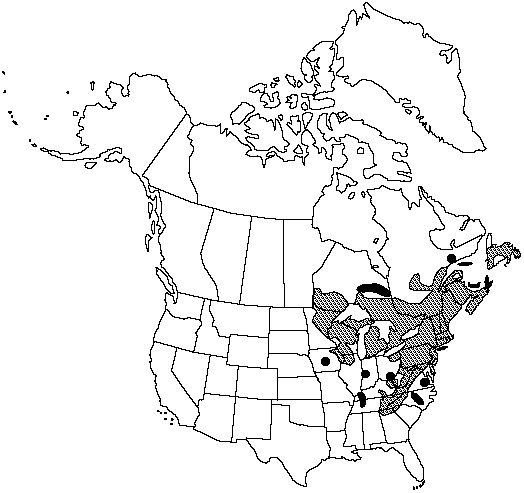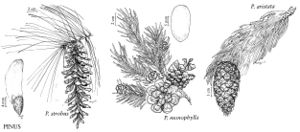Difference between revisions of "Pinus strobus"
Sp. Pl. 2: 1001. 1753.
FNA>Volume Importer |
FNA>Volume Importer |
||
| Line 26: | Line 26: | ||
}}<!-- | }}<!-- | ||
| − | --><span class="statement" id="st- | + | --><span class="statement" id="st-undefined" data-properties=""><b>Trees </b>to 67m; trunk to 1.8m diam., straight; crown conic, becoming rounded to flattened. <b>Bark</b> gray-brown, deeply furrowed, with long, irregularly rectangular, scaly plates. <b>Branches</b> whorled, spreading-upswept; twigs slender, pale red-brown, glabrous or pale puberulent, aging gray, ±smooth. <b>Buds</b> ovoid-cylindric, light red-brown, 0.4–0.5cm, slightly resinous. <b>Leaves</b> 5 per fascicle, spreading to ascending, persisting 2–3 years, 6–10cm × 0.7–1mm, straight, slightly twisted, pliant, deep green to blue-green, pale stomatal lines evident only on adaxial surfaces, margins finely serrulate, apex abruptly acute to short-acuminate; sheath 1–1.5cm, shed early. <b>Pollen</b> cones ellipsoid, 10–15mm, yellow. <b>Seed</b> cones maturing in 2 years, shedding seeds and falling soon thereafter, clustered, pendent, symmetric, cylindric to lance-cylindric or ellipsoid-cylindric before opening, ellipsoid-cylindric to cylindric or lance-cylindric when open, (7–)8–20cm, gray-brown to pale brown, with purple or gray tints, stalks 2–3cm; apophyses slightly raised, resinous at tip; umbo terminal, low. <b>Seeds</b> compressed, broadly obliquely obovoid; body 5–6mm, red-brown mottled with black; wing 1.8–2.5cm, pale brown. <b>2n</b> =24.</span><!-- |
-->{{Treatment/Body | -->{{Treatment/Body | ||
| Line 57: | Line 57: | ||
|publication year=1753 | |publication year=1753 | ||
|special status= | |special status= | ||
| − | |source xml=https://jpend@bitbucket.org/aafc-mbb/fna- | + | |source xml=https://jpend@bitbucket.org/aafc-mbb/fna-data-curation.git/src/9216fc802291cd3df363fd52122300479582ede7/coarse_grained_fna_xml/V2/V2_356.xml |
|genus=Pinus | |genus=Pinus | ||
|species=Pinus strobus | |species=Pinus strobus | ||
| − | |||
| − | |||
| − | |||
| − | |||
| − | |||
| − | |||
| − | |||
| − | |||
| − | |||
| − | |||
| − | |||
| − | |||
| − | |||
| − | |||
| − | |||
| − | |||
| − | |||
| − | |||
| − | |||
| − | |||
| − | |||
| − | |||
| − | |||
| − | |||
| − | |||
| − | |||
| − | |||
| − | |||
| − | |||
| − | |||
| − | |||
| − | |||
| − | |||
| − | |||
| − | |||
| − | |||
| − | |||
| − | |||
| − | |||
| − | |||
| − | |||
| − | |||
| − | |||
| − | |||
| − | |||
| − | |||
| − | |||
| − | |||
| − | |||
| − | |||
| − | |||
| − | |||
| − | |||
| − | |||
| − | |||
| − | |||
}}<!-- | }}<!-- | ||
-->[[Category:Treatment]][[Category:Pinus]] | -->[[Category:Treatment]][[Category:Pinus]] | ||
Revision as of 13:18, 27 July 2019
Trees to 67m; trunk to 1.8m diam., straight; crown conic, becoming rounded to flattened. Bark gray-brown, deeply furrowed, with long, irregularly rectangular, scaly plates. Branches whorled, spreading-upswept; twigs slender, pale red-brown, glabrous or pale puberulent, aging gray, ±smooth. Buds ovoid-cylindric, light red-brown, 0.4–0.5cm, slightly resinous. Leaves 5 per fascicle, spreading to ascending, persisting 2–3 years, 6–10cm × 0.7–1mm, straight, slightly twisted, pliant, deep green to blue-green, pale stomatal lines evident only on adaxial surfaces, margins finely serrulate, apex abruptly acute to short-acuminate; sheath 1–1.5cm, shed early. Pollen cones ellipsoid, 10–15mm, yellow. Seed cones maturing in 2 years, shedding seeds and falling soon thereafter, clustered, pendent, symmetric, cylindric to lance-cylindric or ellipsoid-cylindric before opening, ellipsoid-cylindric to cylindric or lance-cylindric when open, (7–)8–20cm, gray-brown to pale brown, with purple or gray tints, stalks 2–3cm; apophyses slightly raised, resinous at tip; umbo terminal, low. Seeds compressed, broadly obliquely obovoid; body 5–6mm, red-brown mottled with black; wing 1.8–2.5cm, pale brown. 2n =24.
Habitat: Mesic to dry sites
Elevation: 0–1500m
Distribution

St. Pierre and Miquelon, Man., N.B., Nfld., N.S., Ont., P.E.I., Que., Conn., Del., Ga., Ill., Ind., Iowa, Ky., Maine, Md., Mass., Mich., Minn., N.H., N.J., N.Y., N.C., Pa., Ohio, R.I., S.C., Tenn., Vt., Va., W.Va., Wis., Mexico, Central America in Guatemala.
Discussion
Pinus strobus is an important timber tree; because of extensive lumbering, few uncut stands remain. It was once prized as a source for ship masts, and large tracts of it were reserved for the Royal Navy during colonial times.
Pinus strobus var. chiapensis appears to be as Martínez saw it: a clinal variant that, compared to the type variety, has finer leaves, different resin canal distribution, and heavier cones when cones of similar sizes are compared.
Eastern white pine (Pinus strobus) is the provincial tree of Ontario and the state tree of Maine and Michigan.
Selected References
None.
